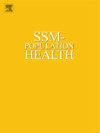陪产假、新父母的心理健康和幸福:来自英国一项全国性调查的证据
IF 3.1
2区 医学
Q1 PUBLIC, ENVIRONMENTAL & OCCUPATIONAL HEALTH
引用次数: 0
摘要
陪产假有可能帮助父母,让新爸爸有时间和家人在一起。然而,关于其与父母心理健康和幸福之间关系的现有证据好坏参半。本研究使用了英国全国家庭调查“理解社会”(Understanding Society)的数据,研究了2009-2019年出生的婴儿的父亲(n = 1385)和母亲(n = 1384)休陪产假的情况及其与心理健康和幸福指标的关系。本研究采用logistic回归方法探讨父母休陪产假的情况,并采用逆概率加权回归调整(IPWRA)来估计父母休陪产假与孩子出生后几个月内的心理健康(Short Form-12 mental Component Score, SF-12 MCS)和心理健康(General health Questionnaire-12, GHQ-12 caseness)之间的关系。受教育程度较高的父亲和出生在英国的父亲休陪产假的几率更高。在调整了潜在的混杂因素后,我们发现在我们的整个样本中,陪产假与母亲或父亲的心理健康或心理健康之间没有强有力的联系。这一发现对于包括替代模型规格、缺失数据的输入和加权在内的一系列敏感性分析是稳健的。然而,亚组分析显示,家庭收入中位数以上的父亲如果休陪产假,心理健康状况会更好(SF-12 MCS差异1.43点;95% ci 0.25,2.62;p = 0.02)。需要改进政策,以确保育儿假减少心理健康和福祉方面的不平等。本文章由计算机程序翻译,如有差异,请以英文原文为准。
Paternity leave, mental health and wellbeing for new parents: evidence from a national survey in the UK
Paternity leave has the potential to help parents by enabling new fathers to spend time with their families. However, existing evidence about its association with parental mental health and wellbeing is mixed.
This study used data from Understanding Society, a national UK household survey, to examine uptake of paternity leave and its association with measures of mental health and wellbeing for fathers (n = 1385) and mothers (n = 1384) of infants born 2009–2019. We used logistic regression to explore paternity leave uptake and inverse probability weighted regression adjustment (IPWRA) to estimate the association between paternity leave uptake and the mental wellbeing (Short Form-12 Mental Component Score (SF-12 MCS)) and mental health (General Health Questionnaire-12 (GHQ-12) caseness) of fathers and mothers in the months after the birth of their child.
Odds of taking paternity leave were higher for more educated fathers and those born in the UK. After adjusting for potential confounders, we found no strong evidence of association between paternity leave and mental wellbeing or mental health of mothers or fathers in our overall sample. This finding was robust to a range of sensitivity analyses including alternative model specifications, imputation of missing data, and weighting. However, subgroup analysis showed that fathers with above median household incomes had better mental wellbeing if they took paternity leave (1.43-point difference in SF-12 MCS; 95 % CI 0.25,2.62; p = 0.02).
Improved policies are needed to ensure parental leave reduces inequalities in mental health and wellbeing.
求助全文
通过发布文献求助,成功后即可免费获取论文全文。
去求助
来源期刊

Ssm-Population Health
PUBLIC, ENVIRONMENTAL & OCCUPATIONAL HEALTH-
CiteScore
6.50
自引率
2.10%
发文量
298
审稿时长
101 days
期刊介绍:
SSM - Population Health. The new online only, open access, peer reviewed journal in all areas relating Social Science research to population health. SSM - Population Health shares the same Editors-in Chief and general approach to manuscripts as its sister journal, Social Science & Medicine. The journal takes a broad approach to the field especially welcoming interdisciplinary papers from across the Social Sciences and allied areas. SSM - Population Health offers an alternative outlet for work which might not be considered, or is classed as ''out of scope'' elsewhere, and prioritizes fast peer review and publication to the benefit of authors and readers. The journal welcomes all types of paper from traditional primary research articles, replication studies, short communications, methodological studies, instrument validation, opinion pieces, literature reviews, etc. SSM - Population Health also offers the opportunity to publish special issues or sections to reflect current interest and research in topical or developing areas. The journal fully supports authors wanting to present their research in an innovative fashion though the use of multimedia formats.
 求助内容:
求助内容: 应助结果提醒方式:
应助结果提醒方式:


